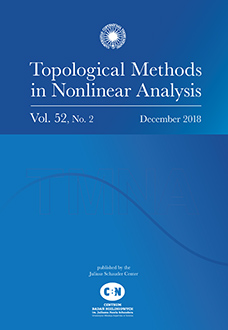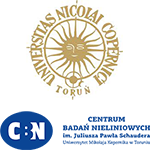Abstract
In this article we are concerned with the following Choquard equation \begin{alignat*}2 -\Delta u &= \lambda|u|^{q-2}u +\bigg(\int_{\Omega}\frac{|u(y)|^{2^*_{\mu}}}{|x-y|^{\mu}}dy\bigg)|u|^{2^*_{\mu}-2}u,\quad u> 0, &\quad& \text{in }\Omega,\\ u& = 0 &\quad& \text{on } \partial \Omega , \end{alignat*} where $\Omega$ is an open bounded set with continuous boundary in $\mathbb{R}^N$ $( N\geq 3)$, $2^*_{\mu}=({2N-\mu})/({N-2})$ and $q \in [2,2^*)$ where $2^*={2N}/({N-2})$. Using Lusternik-Schnirelman theory, we associate the number of positive solutions of the above problem with the topology of $\Omega$. Indeed, we prove that if $\lambda < \lambda_1$, then problem has $\text{cat}_{\Omega}(\Omega)$ positive solutions whenever $q \in [2,2^*)$ and $N> 3 $ or $4< q< 6 $ and $N=3$.
Citation
Divya Goel. "The effect of topology on the number of positive solutions of elliptic equation involving Hardy-Littlewood-Sobolev critical exponent." Topol. Methods Nonlinear Anal. 54 (2A) 751 - 771, 2019. https://doi.org/10.12775/TMNA.2019.068





